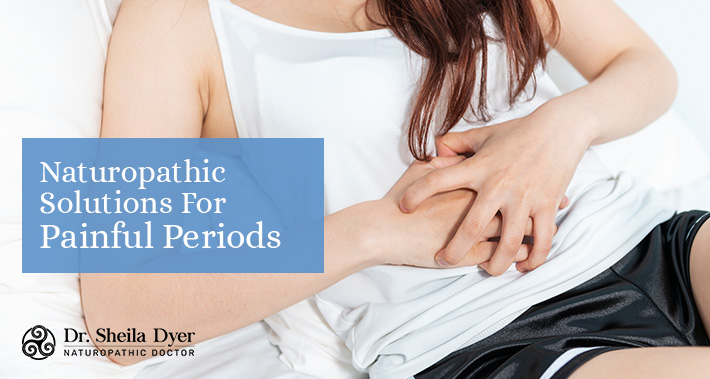
Recently, we looked at some of the reasons why you might be experiencing painful periods.
There are a number of underlying health conditions which can result in severe discomfort during one’s menstrual cycle – we took a closer look at some of those last week.
Today we will look at some natural ways to manage this pain and ways in which naturopathic services can be helpful to manage the symptoms of dysmenorrhea.
RECAP: What Is Dysmenorrhea?
Dysmenorrhea is another way of saying painful periods.
It generally takes the form of painful cramping in the lower abdomen.
Severe cases of dysmenorrhea can cause debilitating pain and are a major reason for people who get periods to be absent from work or school.
Obviously, missing work or school can be disruptive, and result in consequences when it comes to grades or pay – as such at solutions for managing pain are much sought-after by those who experience severe cramps.
For more details on this, check out last week’s article on dysmenorrhea where we cover it in further depth.
Let’s have a closer look at some ways to manage this pain.
Naturopathic Solutions For Dysmenorrhea
Many people find over-the-counter medications such as Advil or Tylenol not strong enough to deal with particularly bad menstrual cramps.
Others just wish to reduce their reliance on these drugs, as they can have side effects.
Naturopathic medicine can offer solutions to help ease cramps, and make “that time of the month” a little more bearable.
1. First, Identify The Root Cause
Before you know what treatments may be effective for your menstrual pain, it’s important to understand what’s causing it in the first place.
For example, a 2003 study showed that Neptune krill oil, rich in omega-3 fatty acids, could be used to significantly reduce menstrual pain.
That’s helpful, but the study was specifically geared toward those who experience menstrual pain as a result of PMS.
If PMS isn’t the root cause of your menstrual pain, Neptune krill oil won’t do much good.
Likewise, a 2018 study found a diet rich in soy could reduce menstrual pain related to endometriosis.
If you have endometriosis, that information can be helpful.
As a result, the solutions below are more general solutions which can help you manage your menstrual pain.
For more specifics on how to address the root cause of your unique menstrual woes, contact me to book an appointment.
2. Acupuncture
A recent Australian study looked at the use of acupuncture in providing treatment for menstrual pain.
Study participants received acupuncture treatments, at varying levels of frequencies.
Those who received it at a higher frequency experienced significant improvements in pain, as well as other symptoms related to menstruation.
Another study showed a combination of acupuncture plus use of herbal remedies to be more effective than ibuprofen for relief of period pain.
It should be noted further studies are needed in order to develop specific guidelines for the use of acupuncture to provide treatment for menstrual cramps and related issues.
3. Ginger
Taking ginger root powder, or sipping ginger tea can help to lower the levels of prostaglandins in the body, which are associated with causing menstrual cramps.
A 2009 study in the Journal of Alternative and Contemporary Medicine found ginger to be equally as effective as ibuprofen or mefenamic acid in managing symptoms of dysmenorrhea.
More studies are required to determine the ideal dosing and frequency for ginger to be used in this way.
4. Pycnogenol
Pycnogenol is made from the bark of pine trees and is a source of antioxidants.
A 2008 study in the Journal of Reproductive Medicine examined the effects of pycnogenol on menstrual pain.
This study found in individuals with dysmenorrhea, the use of pycnogenol lowered the amount of analgesic medication they required and also reduced the number of days they needed to use analgesics.
Therefore, use of pycnogenol may be useful for those wishing to reduce the amount of over-the-counter pain medications they are using.
5. Fennel
The herb fennel has been found to help reduce dysmenorrhea in some women.
In 2013, a study in the Iranian Journal of Nursing and Midwifery Research looked at the use of fennel by college students with dysmenorrhea.
The study found while fennel was effective for reducing period pain, study volunteers complained of its unpleasant taste, which is similar to that of black licorice.
It’s a fickle thing, much like cilantro – either you love it or you hate it.
But if you can get past its taste, fennel may be a good nutritional solution for period pain.
Book An Appointment With Dr. Sheila
Do you suffer from painful periods?
Are you looking to reduce the number of over-the-counter pain meds such as Tylenol and Advil you use each month?
Would you like help to determine which naturopathic solution is right for you?
Contact me, Dr. Sheila, today.
As a naturopathic doctor in Toronto, I’ll work with you to determine the best way to tackle your dysmenorrhea, so you no longer have to dread getting your period and can continue to enjoy life.
If you have questions about naturopathic medicine, or would like to start with your first consultation, contact me, and let’s book an appointment.
Dr. Sheila Dyer, ND1080 Dovercourt Rd,
Toronto, ON M6H 2X8
(416) 554-5135
► https://g.page/DrSheilaDyerNd
Dr. Sheila Dyer is a Naturopathic Doctor and a practicing registered nurse offering holistic healthcare with a scientific focus